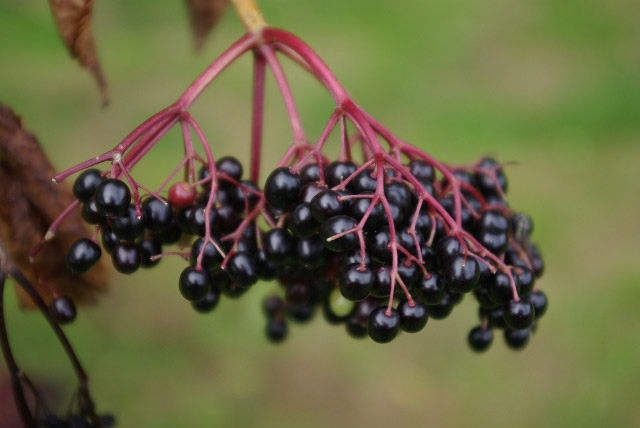The word drug comes from “drogue,” an Old French term describing barrels used to hold dried herbs. For centuries, people relied on the drugs in herbs to treat diseases, knowledge passed down generation to generation. The Herb Society of America is headquartered in Kirtland, Ohio. It’s a national organization that promotes herbs and funds scientific research on the history and uses of beneficial plants.
Katrinka Morgan is executive director of the Herb Society of America, and Karen Kennedy is in charge of education.
Elderberry: International Herb of the Year
 We chat on the back porch of their historic headquarters, as light rain waters the herb garden. Karen Kennedy introduces the international herb of the year, the elderberry. It's been used since prehistoric times as a tonic for respiratory ailments. Both the flowers and berries are used. Flavonoids in elderberries have been shown to have anti-viral properties, but very few human clinical studies have been done. We chat on the back porch of their historic headquarters, as light rain waters the herb garden. Karen Kennedy introduces the international herb of the year, the elderberry. It's been used since prehistoric times as a tonic for respiratory ailments. Both the flowers and berries are used. Flavonoids in elderberries have been shown to have anti-viral properties, but very few human clinical studies have been done.
The value of traditions
Herb lore is in the realm of tradition, sometimes backed-up by science. While the active ingredients of many herbs are known, translating effects in the lab to commercial use can be tricky. Herb cultivation often requires specific conditions that are difficult to up-scale. Concentrations of active ingredients can vary. Preparation, storage, and administration of herbal remedies are difficult to standardize.
Still, the Herb Society's Karen Kennedy believes in the potential value of the herbal tradition. She says, "if a plant has been used for hundreds of years for a particular ailment, across cultures, my guess is there's something there that's real."
The health benefits of the whole plant
Herb Society director Katrinka Morgan laments the loss of herbal lore over the years, although she says pockets of knowledge are retained in the American Appalachians and traditional cultures around the world. She says people have always learned the usefulness of plants growing near them, the original 'localism.'
Kennedy says people need to learn about the whole plant in order to fully benefit from herbs, not just reduce them to a single chemical ingredient. She says it's important to literally "smell the roses," and experience the sight, scent, and touch of therapeutic plants, to have some "down time with your little green."
The Herb Society encourages the interest and cultivation of herbs and learning herb lore, but director Morgan warns that many herbs have drug interactions with medications that need to be monitored by your doctor. For example, the ancient benefits of elderberries come with a warning, the unripe berries are poisonous.
Next week on Exploradio we’ll continue bridging the gap between lore and science by delving into local research on the wonders of pomegranates.
|